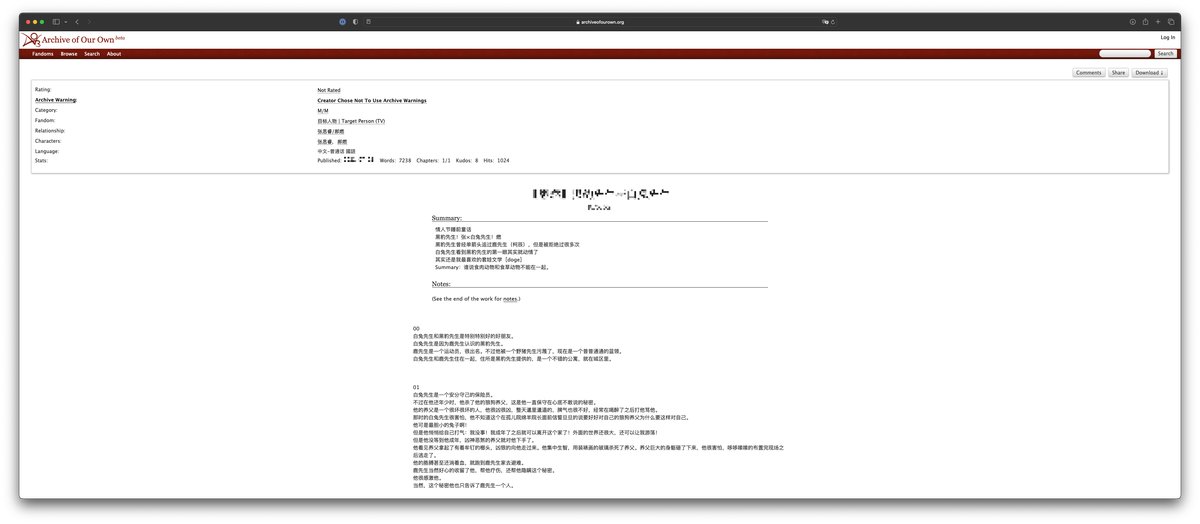How the blacklisting of one popular online forum left droves of Chinese fans of queer fan fiction without a ”home”
In February 2020, as China’s battle against the viral outbreak in Wuhan was dominating global headlines, another fierce battle was being fought on the Chinese internet, ultimately leading to the demise of what many Chinese netizens had been calling their “home”—a popular website for sexually explicit online literature.
The fight began when Chinese fans of The Untamed TV series actor Xiao Zhan got wind of a homoerotic online novel published in Chinese on the US-based fan fiction website Archive of Our Own (AO3), in which Xiao was depicted as a cross-dressing prostitute. The star’s fans took offense and began reporting AO3 to China’s Cyberspace Administration Office for pornographic content. The site became inaccessible in China on February 27.
This infuriated droves of Chinese netizens who had been using the site to create and consume the kind of online literature scarcely found on the heavily content-moderated Chinese internet, particularly the homoerotic sub-genre “Boys’ Love,” commonly abbreviated as BL, to which the Xiao Zhan story belongs. Two years on, China’s Boys’ Love lovers are still searching for alternative ways to safely create and consume the content they crave—not just for entertainment.
BL features romantic, often sexual relationships between two men sometimes based on real-life celebrities or popular TV and movie characters. Perhaps somewhat counterintuitively, these queer stories are generally written by women for women who largely identify as heterosexual. Before it was blacklisted, AO3 had been one of the largest and most reputable bastions of such content freely accessible inside China.
Online literature in general has a massive following in China. According to the China Internet Network Information Center, 493 million people read online literature, almost the same number that engage with online gaming. That’s more than the entire population of the European Union and close to half of all Chinese internet users.
Twenty years ago, entrepreneurs realized the market potential in China and developed successful business models to commodify the creation and consumption of fan fiction and other online literary genres. Qidian is credited with jump-starting the rather simple business model around 2003: The platform is essentially a collection of discussion forums dedicated to certain genres and sub-genres. Fans can write their own online novels, often serialized works with short chapters published on a regular basis. If a critical mass of readers is reached, content can be monetized and paywalled.
More recent Chinese-run platforms like AFDIAN employ a Patreon-like business model where fans can pay their favorite creators directly on a monthly basis. The line between consumption and production is blurred here—the readers on the platform can directly engage with the writers, encourage them, comment on their work, and even pick up stories and characters to develop into their own spin-offs, becoming content creators themselves.
Since AO3 became inaccessible in China, some of the BL fans, generally young heterosexual women in their teens and 20s, have been flocking to the paywalled Chinese alternatives. A paywall can potentially keep unwanted intruders out and the community safe, but content moderation on these mainstream platforms is usually strict, especially considering that many of the BL stories feature sexually explicit, sometimes transgressive content including sadomasochism and other extreme fetishes. As a result of this, another danger may lurk in this commercial environment—criminal prosecution. BL may be classified as pornography, the production and sale of which is prohibited in China.
In 2018 a writer of BL fiction known under the pen name Tianyi learned this the hard way when she was sentenced to over 10 years in prison by a court in Anhui province for producing and distributing her homoerotic novel Occupy about the relationship between a teacher and his student, reportedly earning 150,000 yuan from online sales.
To avoid such controversy, AFDIAN requires content creators to undergo identity verification to become searchable on the site and in its terms of service explicitly states that pornographic content and even sexually suggestive material is prohibited.
The value of a platform like AO3 lay in its non-commercial and anonymous nature where fans could gather, create, and consume this sort of content outside of commodified mainstream culture. BL exists in just about any fandom imaginable: Harry Potter, K-pop, you name it. Characters who are paired as lovers in the story are labeled with a “/” between the names (e.g. Sherlock Holmes/James Watson), which is why this type of fan fiction is also called “slash fiction.”
Some of the earliest slash fiction in China from the mid-00s involved contestants from the 2006 TV show Super Girl. The popular Chinese equivalent of Pop Idol at the time gave rise to a wave of slash fiction including one particularly famous serialized novel called Pink Affairs. Published between 2006 and 2007 on a forum dedicated to Super Girl fan fiction, Pink Affairs tells the fictitious love story between two female contestants from the TV show.
Characters are often depicted as queer even when the real life celebrities they are based on are understood to be heterosexual. Not only is their sexual orientation fluid and ambiguous, even their bodies can be transformed for the sake of the story and readers’ satisfaction. In the sub-genre nisu (泥塑), fans imagine their real life male celebrity crushes to be women, not necessarily as lovers but also in roles like sister or daughter.
“There are, of course, many reasons why women like slash, and I would never claim to have found some kind of skeleton key solution explaining every individual person’s involvement in the phenomenon,” says writer and researcher Morgan Leigh Davies in her blog post about the history of the genre. “The psychological attractions of same-sex pairings are myriad, many of them fairly straightforward: When players in your romantic drama are both men, or both women, the necessary societal complexities that manifest in male/female relationships need never come up.”
Bao Hongwei, associate professor in media studies at the University of Nottingham, argues in his book Queer China that this gender-bending cultural production may be regarded as a form of social commentary, activism even, considering the lived reality of the young Chinese women who make up the largest group of creators and consumers. “China’s rise depends on, and at the same time encourages, a patriarchal and hypermasculine male image, complete with a heteronormative and reproductive family,” writes Bao.
In a country where a state-sanctioned Wolf Warrior kind of hypermasculinity permeates mainstream culture, it is conceivable why young women would want to create their own worlds, where heteronormative societal pressures can be sidestepped to work out ideas about sexuality and romance on their own terms. “If the culture were free of misogyny—if the patriarchy, that is, did not exist—[slash] would not be necessary, or would be the simple equivalent of men getting off on watching lesbians get off,” writes Davies.
But with increasing crackdowns on gay and other content deemed “harmful,” spaces for such queer cultural production are becoming scarce in China. Fans are coming up with increasingly creative ways to feed their fantasies on mainstream platforms like Weibo. Some of the more conventional ways of avoiding algorithmic filtering and hiding sensitive BL-related content in plain sight revolve around the manipulation of images so they’re not picked up on by automated filters, like turning images upside down or overlaying text with scrambled symbols.

Daican posts featuring innocent images become memes on Weibo, leaving the reader to imagine other connotations (Screenshot from Weibo)
But as algorithmic filters are becoming more efficient, fans have to come up with more creative ways of bypassing them. So-called daican (代餐) or “meal replacement” meme posts on Weibo replace explicit imagery (i.e. the forbidden “food”) with some placeholder that spurs the imagination, often pictures or videos featuring cats and dogs in suggestive poses.
To an outsider, the picture or video may just show two cats accompanied by some cryptic caption. But in the fans’ minds, such posts can carry strong sexual innuendo and the animals can be mentally substituted for their favorite paired celebrities. A thought community, it seems, that navigates collective mindscapes where common dreams, desires, and imaginations are triggered by signs and codes only insiders understand. Perhaps one day, all that will be left online is a blank page, but the fantasy may live on inside.















